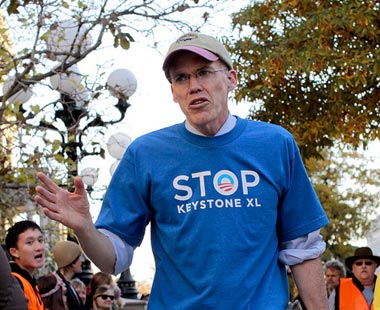Enviros’ opposition to the Keystone XL pipeline has succeeded in delaying or possibly even deep-sixing a project that would have carried oil from the tar sands in Canada to refineries in Texas (and over a drinking water aquifer and the epicenter of a bunch of earthquakes).
But not everyone is celebrating. Professional wet blanket Michael Levi wants you to know that this is probably a pyrrhic victory, more likely to result in delays to the kind of action the U.S. needs to take to avert the worst of climate change's effects.
And he has a point, sort of. If Keystone XL was defeated primarily because of local opposition (in Nebraska, for example, where it was to cross an aquifer) rather than concerns about climate change, that means locals could some day block all kinds of renewable energy projects they'd rather weren't in their backyards.
That's already happened with the Cape Wind offshore wind project, which is permanently going nowhere because people who would otherwise be in favor of it are concerned it will ruin the view from their compound in Cape Cod.
Levi is not just being a lone beardo with a sandwich board. Here's a remarkably similar take on Keystone XL from Bryan Walsh at Time.
What this view misses is the fact that a) renewables do not generate opposition on the same scale as fossil fuel projects and b) the renewables most likely to get us off fossil fuels forever don't generate any kind of opposition at all.
Let's compare wind power and natural gas fracking. The latter produces inordinate amounts of noise, toxic air pollution, occasional groundwater contamination, and frickin’ EARTHQUAKES, and is banned in New York State. The former is occasionally blocked by concerned locals, but already covers huge swaths of Texas, which is not exactly known as a haven for tree-hugging hippies or people who appreciate infringement of their property rights.
And now let's think about the future. Levi cites local opposition to transmission lines as one of the issues dogging rollout of renewables, and he's right insofar as old-style centralized power production is our future. But what if it's not? Rooftop solar is already rapidly approaching the retail cost of electricity, and it's increasingly clear that renewables, even wind, work best when they're distributed and not centralized.
The idea that locals are going to find solar shingles — or wind turbines in the middle of mostly uninhabited swaths of farm land — as offensive as a gigantic oil pipeline isn't just laughable, it's bizarre. And the notion that the only way forward is an energy system that resembles the one we have now is shortsighted.




